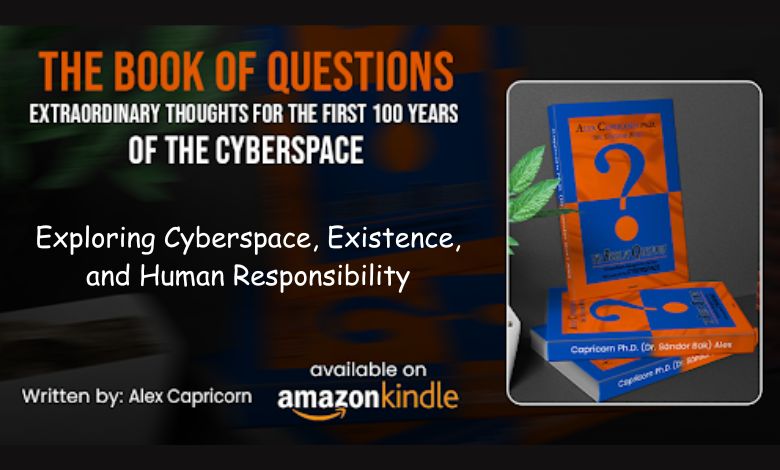In today’s digital age, where technology and cyberspace are an integral part of our lives, few works explore the profound philosophical and existential implications of this reality. Alex Capricorn’s The Book of Questions: Extraordinary Thoughts for the First 100 Years of the CYBERSPACE offers a deep dive into the very essence of our relationship with technology, cyberspace, and the evolving digital frontier. Through a unique blend of intellectual rigor and futuristic speculation, this book challenges readers to confront critical questions about the future of cyberspace, artificial intelligence, and our place in an ever-evolving technological world.
Cyberspace and the Questions that Shape Our Future
One of the most intriguing aspects of The Book of Questions is its exploration of cyberspace and its potential impact on the world in the coming century. Written by Dr. Alex Capricorn, the book’s central premise revolves around fundamental existential inquiries that arise from our increasing immersion in cyberspace. Rather than simply addressing technology from a functional or theoretical standpoint, Capricorn looks into the deeper, more philosophical aspects of what it means to exist in a world governed by cyberspace. The book not only raises profound questions about the nature of our relationship with digital realities but also offers insight into how this relationship may evolve in the near future.
A key concept in the book is the I.Silicon Genesis, a revolutionary idea that aims to challenge conventional notions of software and digital development. Through this, Capricorn pushes the boundaries of cyberspace as we know it, suggesting that the first decade of the 22nd century will herald an era where human consciousness, software development, and cyberspace intertwine in ways that are difficult to even imagine today. The book explores how these developments may reshape human identity, responsibility, and our understanding of life itself.
Addressing Software-Independent Questions
One of the book’s most unique contributions is its approach to software-independent questions related to cyberspace. In a world where software and digital systems are the cornerstones of virtually every facet of modern life, Capricorn dares to ask what happens when we look beyond the constraints of existing systems. How will society function when the digital realm can no longer be separated from our understanding of reality? How do we reconcile the notion of free will with the increasing dominance of artificial intelligence?
Capricorn challenges readers to think critically about the ethical, social, and political implications of cyberspace. As we continue to integrate technology into every aspect of our lives, these questions become ever more relevant, prompting readers to examine the future through a lens of moral responsibility. By raising these issues, The Book of Questions pushes readers to confront their assumptions about the role of technology in shaping the future of humanity.
Fatal Questions and Responsibility
Another key theme in The Book of Questions is the concept of fatal questions. These are questions that, when posed, have the potential to drastically alter the course of human understanding and progress. They challenge us to think about the very nature of existence, technology, and the consequences of our actions. What happens when we no longer have control over the systems we’ve created? What does it mean to be responsible in a world where digital and physical realities blur? Capricorn urges readers to consider how our choices today will impact the future, both in terms of technology and society.
By tackling these fatal questions, the book explores the pressing need for ethical frameworks in cyberspace. As technology continues to advance, we must ask ourselves how we will navigate the complexities of a world where the lines between human agency and artificial intelligence are increasingly difficult to distinguish. The Book of Questions offers no simple answers but encourages a deeper reflection on the nature of responsibility in the digital age.
An Intellectual Journey for the Future
Dr. Capricorn’s book is not just for tech enthusiasts or philosophers; it is a must-read for anyone who is concerned about the future of our digital world. The Book of Questions invites readers to embark on an intellectual trip to the heart of cyberspace, offering new insights into the nature of human existence and our relationship with technology. It pushes the boundaries of what we understand about the intersection of cyberspace and the human experience, asking questions that are bound to resonate long after the book is finished.
The work is both challenging and rewarding, asking its readers to rethink their place in the digital world and to consider the future of humanity in a rapidly changing landscape. With its combination of intellectual depth and speculative thought, The Book of Questions is a timely exploration of what lies ahead in the era of cyberspace and artificial intelligence.
A Book for the Modern Era
In conclusion, The Book of Questions: Extraordinary Thoughts for the First 100 Years of the CYBERSPACE is a groundbreaking work that offers profound insights into the intersection of technology, philosophy, and human responsibility. It challenges readers to question the assumptions they have about cyberspace and its role in shaping our future. Dr. Alex Capricorn’s exploration of cyberspace, its implications, and its potential evolution is an intellectually stimulating experience that encourages readers to reflect deeply on the world we are creating. This book is an essential read for anyone looking to understand the complexities of our digital future and the moral questions that come with it.
AVAILABLE ON AMAZON KINDLE:
ALSO READ : ps://theguestblogs.com/powder-coatings-market-size-share-trends-demand-growth-and-competitive-analysis-2030/






